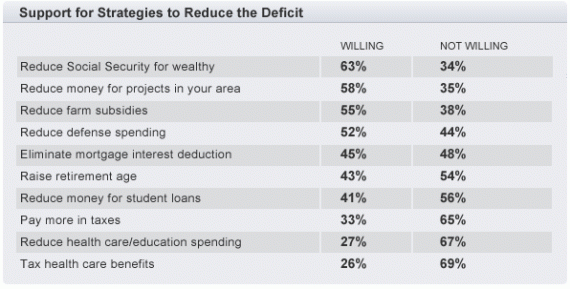Americans Hate Taxes And The National Debt, Don’t Know What They Want To Cut
The American public still has a totally unrealistic view of what it will take to get the Federal Government's fiscal house in order.
Two new polls show the eternal conumdrum that America finds itself in when it comes to Federal spending, the Budget Deficit and National Debt, and taxes. Americans all seem to agree that debt is bad, that taxes shouldn’t go up, and that we need to cut spending, but they aren’t willing to commit to the kind of spending cuts that would be necessary to really solve the problems we find ourselves dealing with.
First, there’s a new poll from Reuters that shows, not surprisingly, that Americans are almost universally opposed to raising the debt ceiling:
The U.S. public overwhelmingly opposes raising the country’s debt limit even though failure to do so could hurt America’s international standing and push up borrowing costs, according to a Reuters/Ipsos poll released on Wednesday.
Some 71 percent of those surveyed oppose increasing the borrowing authority, the focus of a brewing political battle over federal spending. Only 18 percent support an increase
This isn’t all that surprising. Raising the debt ceiling has never been a politically popular vote to begin with, and the consequences of failing to do aren’t easy to explain to the public.
Of course, if Congress went along with the public on this, there would only be two ways to avert the crisis that a debt default would inevitably create. Either they’d have to increase revenue, meaning taxes, or they’d have to start cutting spending, and when it comes to spending, the American public has no idea what it wants. Here is a list of the areas where poll respondents said they would favor cutting spending, ranked in descending order of the percentage of support that exists for cuts:
- Foreign aid – 73%
- Tax collection efforts – 65%
- Financial regulation enforcement – 53%
- Military – 53%
- Environmental enforcement -45%
- Education – 24%
- Medicare – 23%
- Social Security – 2o%
This is not at all helpful to a reasoned discussion of how we are going to deal with Federal spending. Even if the top three spending categories were eliminated entirely, they would make virtually no dent at all in the Budget Deficit. The one good sign is that there appears to be public acceptance of the idea that military spending is on the table, although even there significant reductions in the $ 700 billion we spend every year on defense unless we start rethinking our role in the world and whether we really do want to continue to be the world’s policeman. And the good news ends there. Two of the biggest line items in the Federal Budget are Medicare and Social Security (and yes, I know that SSI is technically independent of the Federal Budget, but it’s being funded with IOUs from the Federal Budget), and only 1 in 5 Americans are willing to consider cuts.
So, if you’re not going to make big spending cuts, then the only other option is to raise taxes, right? Not according to a new poll from CBS News:
News poll finds that Americans strongly prefer cutting spending to raising taxes to reduce the federal deficit. While 77 percent prefer to cut spending, just nine percent call for raising taxes. Another nine percent want to do both.
Yet most Americans could not volunteer a program they’d be willing to see cut in order to reduce the deficit – only 38 percent could name a program they would support cutting. The top responses were military/defense (six percent), Social Security/Medicare (four percent) and welfare/food stamps (four percent).
And, as with the Reuters poll, there isn’t a whole lot of agreement on what should be cut:
The numbers are actually a little better here than in the Reuters poll, but it’s still true that most of the programs for which there is majority support for cuts amount to a very small part of the overall budget, and part of the reason for that may be that the public does not have a realistic idea of what the budget is made up of:
Most Americans do not know exactly how the government spends its money. For example, when asked what percent of the budget goes to earmarks, 41 percent said they make up less than 20 percent of the budget, 13 percent said 20-50 percent, 4 percent said more than 50 percent and 42 percent didn’t know. Earmarks actually make up less than one percent of the budget.
When the public doesn’t know what is actually in the Federal Budget, they’re not going to have a realistic idea of how to fix our fiscal problems,
There’s only one way to fix the budget mess that we’re in. It’s unpopular, it won’t be easy, and some people will have to make sacrifices, but it is absolutely necessary:
In order to really get at the heart of federal spending, entitlements need to be on the table, and right now. We need to start scaling them back to safety-net size rather than comprehensive entitlements. Federal pension systems have to be transformed into defined-contribution rather than defined-benefit plans. It won’t be popular, but structurally, that’s the only approach to the budget that gets us back to fiscal balance.
We’re only going to get there, though, when politicians start being honest with the American people, and that isn’t happening.



Since I hate to be left out of cultural trends, I’m making a sustained effort to think like a Tea Partyer. So this is easy: we cut NPR funding and leave it for our grandchildren to figure out the rest.
it is deep irony – high approval for the tax cut deal, followed immediately by high opposition to debt expansion.
FWIW, I bookmarked this a month ago:
Debt Pyramid Scheme Now the Norm in America
Lowenstein takes a stronger position than I would, that all those tax cuts were wrong … but you know, if we can’t find the cuts soon, he’s right.
There was a recent poll that showed the average American overestimates the amount the U.S. spends on foreign aid by at least a factor of 10, which might explain why so many of them want it cut.
This has been true of every poll taken on this topic. I now read and participate in some Tea Party blogs. They talk about cutting spending, but then never mention SS, Medicare and defense provokes a lot of ambivalence.
Steve
Military cuts take precedence over cutting environmental protection? There is some damn hope at least.
Could someone explain to me why Reagan’s corpse isn’t exhumed and hanged yet? He is the one who convinced the commoners that they can have low taxes for yet never curtail spending beyond symbolical, “Screw the freeloader single mothers and young bucks”-bills.
We crossed the line into fantasy during the Reagan administration. That’s when people were told they could cut taxes and still pay for everything — including a huge defense build-up. Reagan successfully sold the people unicorns and leprechauns. Number of balanced budgets submitted by Reagan during 8 years? Zero.
Clinton balanced the budget by raising taxes (and by getting damned lucky) and as soon as George W. Bush came back in it was unicorns and leprechauns all over again.
It is not honest to pretend this is equally bi-partisan. Neither party is entirely honest. But in the liar, liar, pant’s on fire sweepstakes the GOP owns the prize. Democrats tell us we can have all sorts of programs and we have to pay for them with higher taxes, preferably on rich people. Republicans tell us we can have huge tax cuts and balance the budget by cutting the State Department’s foreign language leaflet expenses.
The Democrats are full of crap, but they can’t touch the marvelous cynical fantasy of the other side.
I think Reagan genuinely tried and failed, which is different than cynical disregard.
JP:
Reagan’s own budget director knew he was selling snake oil.
Here is what David Stockman said, michael:
That’s what I’m talkin’ about. He fast-forwards from 1984 to 2009, but I’m really talking about the old guard’s honest attempt.
Maybe to set that in context, we need to back up to ’81:
The cynicism came later, when Republicans took the message that trying wasn’t required. Cue Dick Cheney and “deficits don’t matter.”
“There was a recent poll that showed the average American overestimates the amount the U.S. spends on foreign aid by at least a factor of 10, which might explain why so many of them want it cut.”
It’s not a lot of money compared to the deficit but there’s $2.5 billion aid to Israel that is both completely unwarranted (as they are a first world, thus not deserving economic aid, belligerent power that refuses to abide by the terms of our military aid). The best part is cutting that not only saves us the direct money but also enables is a big foreign policy win.
obviously we can just keep cutting taxes since those always lead to higher revenue. God imagine how huge the surplus will be once we have a 0% tax rate!
what?
“Cue Dick Cheney and “deficits don’t matter.””
What Cheney actually said was – “…Reagan proved that deficits don’t matter”.
I think it kinda ridiculous to excuse the Reaganites by claiming that they sincerely tried to balance the budget. I don’t think you can call it sincere when the basic premise of their pitch was so absurd. Cut taxes, increase defense spending, and balance the budget all at once. No one who understood anything about how the world actually worked believed that, and I don’t think Reagan did either.
Time to pue “EVERYTHING” on the table. A 5% across the board spending cut would solve this problem and create a surplus in 10 years. That’s just using this year as a base and assuming that all the programg now in place are necessary. Let’s get on with it. Who’ll miss 5%.
Don’t we elect people to handle the details? Why do those on the left always look to the average citizen to formulate budget decisions? It took a long time to get here and it’s going to be a slow, complex process to get back but we have to a least start turning things around. If you listen to liberals the Tea Party has to have a instant fix otherwise they’re just blowing smoke. It’s not going to happen that way. Start with any cuts at all and begin slowing down the insanity of spending that we see now.
“Why do those on the left always look to the average citizen to formulate budget decisions?”
Why do those on the right always elect politicians who can’t formulate proper budget decisions?
“If you listen to liberals the Tea Party has to have a instant fix otherwise they’re just blowing smoke.”
On the contrary, Tea Party types need to advocate real budget balancing remedies, not just getting rid of the Department of Education and cutting taxes…